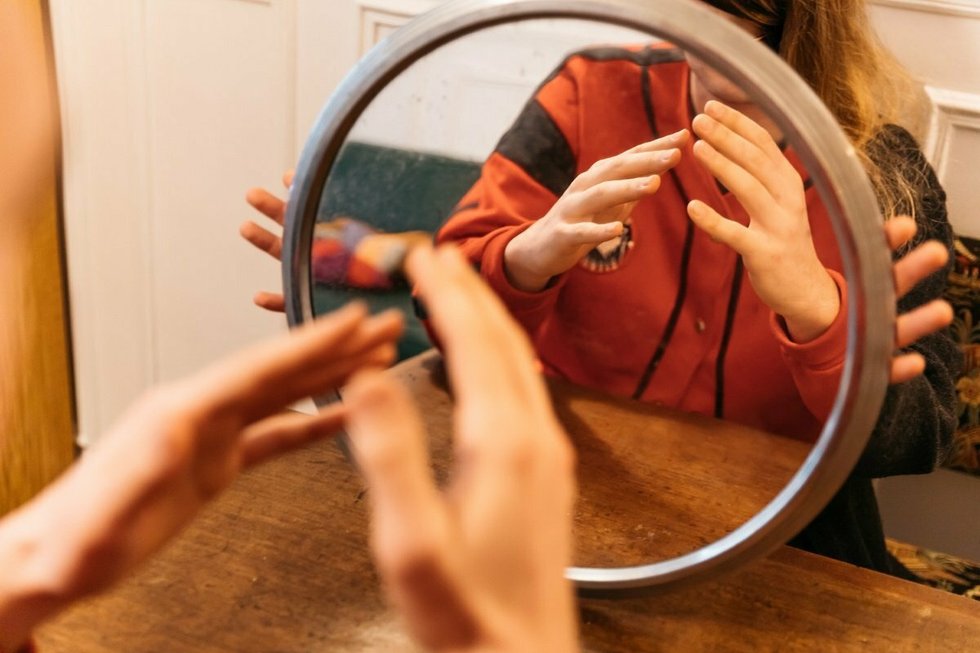Mirror, mirror: how the brain's neurons can boost professional interactions
Mar 29, 2021
5 mins

One-to-ones with your line manager are a breeze when you’re both on the same wavelength, literally. It’s all down to what scientists call “mirror neurons”. When you watch another human perform an action, your brain unconsciously imitates them. It’s a little like mirroring body language to make others feel comfortable in private conversation. Except, of course, this level of neuronal processing is way more complex and nuanced. Erwan Devèze is a neuroleadership and neuro management consultant who has published a book entitled “24h dans votre Cerveau” (“Round-the-clock Brain: how understanding emotions keeps our brains healthy”). We spoke to him about how this special kind of brainpower can help you to become a smooth operator in professional interactions such as job interviews, performance reviews, pay discussions and more.
Unconscious mimicry
A mirror neuron is a busy little brain cell that is activated when a person performs a certain action, has a certain experience, or even simply observes someone else performing that action or having the same experience, according to the Oxford Dictionary of Psychology. “Mirror neurons form a mechanism that activates our neurons whenever we do something or watch someone else doing something,” said Devèze. That’s why yawning is so contagious and why babies smile back at proud parents. Devèze says that we should “think of it as a kind of neuronal wifi”. Neurons are found in our brains and nervous system, and play a primordial role in everyday social interactions. They influence the feelings that motivate us and the impressions, good or bad, that we form about others.
Mirror neurons were first detected by Professor Giacomo Rizzolatti and his colleagues at the University of Parma in the 1990s. The scientists were studying motor neurons in monkeys and observing what happened when the primates ate peanuts. “One day, a lab assistant grabbed a peanut to snack on and observed that the monkey watching him had the same neuronal activity,” said Devèze.
Chemistry—and conversations
This mostly unconscious neuronal response has several functions. The primary one is learning, which often involves mimicry. It influences our interpersonal communications and relationships by means of empathy, feeling human emotions, and second-guessing the motivations of others.
Academics such as Carl O Word, Mark P Zanna, Joel Cooper, and Marianne Bowden have been working to show mimicry’s positive influence on conversations since the 1970s. In their 2020 article, business school professors Maxim Sytch and Yong H Kim noted that lawyers who tailored their communication style to match a judge’s in court won more than their counterparts who did not do so. According to Devèze, “When you copy someone’s gestures, tones, and semantics, you enter their inner world and they end up trusting you unconsciously.” That’s all down to what’s called “neuronal synchronization”.
Mirroring at work
If you mirror verbal and non-verbal communication styles in a job interview, you’re more likely to create chemistry with your interviewer and positively influence the outcome of the meeting. “But if you can’t achieve synchronization,” Devèze said, “it’s entirely possible that the interview won’t be successful. That’s why you might meet a candidate during the recruitment process who ticks all the boxes but still not have a good feeling about hiring them.”
However, you should avoid taking a cut-and-paste approach to a mirror. In other words, it’s not enough to cross your legs every time the recruiter does and use similar hand gestures to them. That’s because Devèze says that “90% of brain activity is unconscious” and that “the mirror function is inside us, but we must activate it”. Making a good impression at an interview requires more than giving great answers and having a winning smile. Paying careful attention to the interviewer’s gestures and words is just as effective in building rapport.
1. Become an active listener
Whether you’re in an interview or one-to-one with your manager, professional encounters can be a bit of a minefield when it comes to concentrating. There are vital points to be made, and objectives to focus
on and, of course, that pen on the table you are dying to fiddle with.
Such a situation can make it easy to forget the importance of active listening. Devèze said, “You must be mindful of the other person’s verbal and nonverbal, conscious and unconscious language. Reading these cues gives you a huge advantage and you’ll be less prone to slip-ups.” Along with the words you hear, there may be more subtle cues such as leg jiggling, hair twirling, and even the shifting intonation of their voice. While seemingly innocuous, these gestures can be clues that reflect the inner state of your conversation partner. And you can put this detective work to good use by adapting your approach accordingly.
2. Boost your emotional intelligence
There are two types of empathy: affective and cognitive. Affective empathy allows you to discern emotions, while cognitive empathy enables you to recognize and understand states of mind. Devèze believes that both kinds of empathy must be developed—and in equal measure. He said, “A high level of cognitive empathy puts us in a good negotiating position, whereas the affective dimension helps us to understand the other’s emotions, feelings, discomfort, fears… But we must avoid being overwhelmed by our emotions.” This approach involves not only taking an interest in someone but also understanding how to put yourself into their shoes. For example, why do they approach the problem from that specific angle? Why do they appear nervous? After you’ve dug a little deeper, it’ll be much easier to understand what makes them tick.
3. Imitation is the sincerest form of flattery
A social psychology experiment carried out in a Dutch restaurant revealed that mimicry actually makes people more generous. Servers who repeated orders back to their customers got better tips more often than the ones who simply said, “Thanks, got it.” In fact, literally repeating the speech of others has social benefits as well. It can vastly reduce the chance of potential misunderstandings and demonstrates good listening skills and empathy. It can even help retrieve new information, as the original speaker will be faced with their own words.
4. It’s okay to be assertive
Assertiveness is basically the ability to express your point of view with confidence. That does not mean forcing it on others. In fact, it’s quite the opposite. Being assertive also involves respecting ideas you may not agree with. Devèze said, “When relating to others, we often have a tendency to merely go through the motions, but we must also listen to what the other person has to say, even when we don’t agree with their ideas.” Calm and conciliatory communication puts everyone at ease. It’s better to take the time to listen to different perspectives than to end heated discussions with, “Whatever. Fine. That’s your opinion.” No matter how much you might disagree, shutting others down isn’t going to make for healthy and mutually beneficial professional relationships.
5. Mimes beware!
Taking a cue from the gestures, tone, and semantics of someone else lays down the foundations of neuronal synchronization. But be careful not to go overboard or you may simply make them feel uncomfortable. Devèze said, “If your approach is heavy-handed or manipulative, the other person is likely to notice and that’s like a double blow. If you make them doubt your sincerity, you won’t be able to build a trusting relationship.” In other words, you should stop mirroring the moment you find yourself practicing the art of miming. (Because mimes are a bit creepy.)
Harnessing the power of your mirror neurons is much more complex than a straightforward imitation game. It requires a certain amount of mindfulness, observation, and grace. When done right, it is a constructive way to ensure you are on the same wavelength as your interviewer so that you can positively influence the outcome of your interview.
Translated by Andrea Schwam
Photo: Welcome to the Jungle
Follow Welcome to the Jungle on Facebook, LinkedIn, and Instagram, and subscribe to our newsletter to get our latest articles every day!

More inspiration: Ace your job interview

Why are you leaving your job? Here's how to nail the answer
Caught off guard by 'Why are you leaving your job?' Here's how to flip this tricky question into a spotlight on your goals and potential.
Dec 24, 2024

Standing out in an interview: Creative responses to common questions
Answering common interviews with common responses isn't going to get you far in today's job market. Here's how to truly stand out!
Nov 26, 2024

The Pratfall Effect: Can screwing up in a job interview make you more likable?
Mistakes you make in a job interview could actually work to your advantage ...
Oct 14, 2024

How to bring up your long-term career goals in an interview
Be honest but strategic. The key is aligning your goals with the role while showing flexibility and ambition. Avoid faking it!
Sep 24, 2024

Is honesty the key to discussing your weaknesses?
Are your weaknesses holding you back in an interview? A bit of honesty can flip the script and make your flaws work in your favor.
Aug 21, 2024
The newsletter that does the job
Want to keep up with the latest articles? Twice a week you can receive stories, jobs, and tips in your inbox.

Looking for your next job?
Over 200,000 people have found a job with Welcome to the Jungle.
Explore jobs
